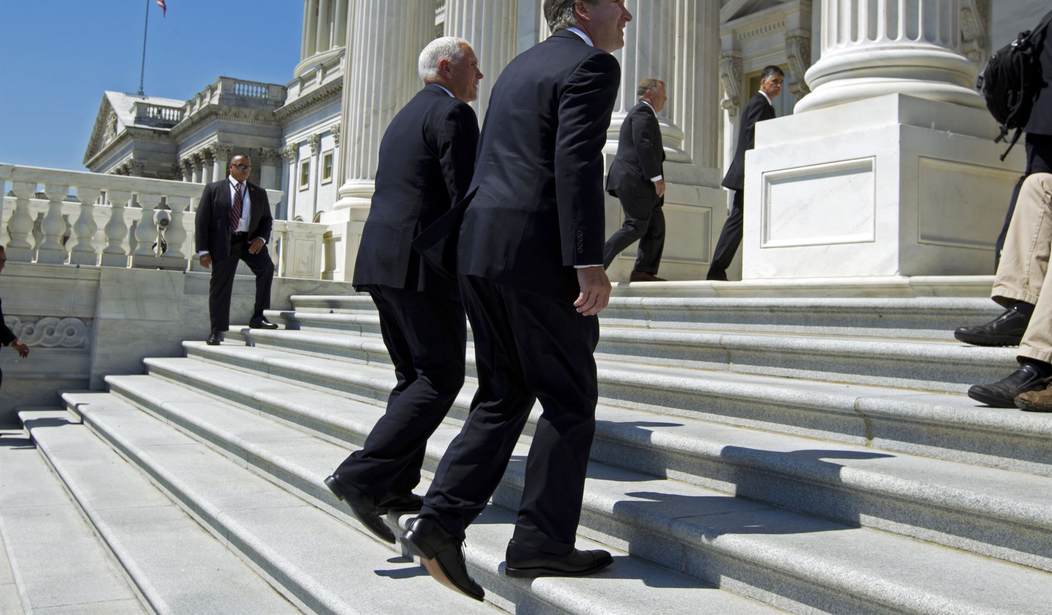The nomination of Brett Kavanaugh for the U.S. Supreme Court is a welcome move. As readers of my column know, I am no Donald Trump fan, but in this instance, the president has done well. Kavanaugh, whom I've worked with in the past, is a serious jurist with one of the most impressive backgrounds of any Supreme Court nominee in recent history. His record speaks for itself, and senators will have ample opportunity to question his past opinions and decipher his legal doctrine before confirming him to the high court. But what they should not do is attempt to play politics with the nomination. Unfortunately, Democrats are doing just that in a tit-for-tat attempt to stop Kavanaugh's appointment.
Their first line of attack was to claim that President Trump should not have the right to get his choice confirmed before the midterm elections, claiming the same logic employed by Republicans when President Barack Obama tried to get Judge Merrick Garland appointed before the 2016 election after Justice Antonin Scalia's death. I didn't agree with Senate Majority Leader Mitch McConnell's refusal to bring up the nomination of Garland for a vote. In my view, presidents should be given maximum leeway in appointing justices, provided they are qualified, and the Senate has an obligation to act on a nomination and vote to confirm or deny the appointment. But even though the Republicans' pausing because of a pending presidential election was a thin reed, that is no justification for not voting in advance of a midterm election, especially in a year in which control of the Senate is exceedingly unlikely to change.
But Democrats aren't stopping at procedural objections to Kavanaugh's appointment. They are busy marshaling a political campaign against him because they think he would be a pivotal vote to overturn Supreme Court precedents on abortion. In outrageously misleading rhetoric, Sen. Patty Murray said on the Senate floor, "A vote for President Trump's Judge Kavanaugh is a vote to go back to the days when women had to go into back alleys for health care, when women had to ask for permission, when women were shamed and when women and girls died because of the laws of our land." Her comments made Senate Minority Leader Chuck Schumer's claim that "Judge Kavanaugh's own writings make clear that he would rule against reproductive rights and freedoms" seem moderate by comparison. There is simply nothing in Kavanaugh's record that suggests either of those scenarios would be likely.
Recommended
The central question in the abortion debate is -- as it has been since Roe v. Wade in 1973: How do we balance the rights of the pregnant woman with the rights of the unborn life she carries, and who gets to decide? Even under Roe, there was no absolute right of the mother to an abortion through nine months of pregnancy. Roe provided that at some point during gestation, the state has an interest in considering protection for the unborn fetus. As Roe originally framed it, the state's interest in preserving life came when the fetus would be capable "of meaningful life outside the mother's womb." Subsequent decisions modified Roe, and advances in the ability to save prematurely born babies made obsolete the decision's original framework of trimesters as a reference for determining fetal viability, but the court has never upheld an absolute constitutional right to abortion at all times during pregnancy.
In recent years, the abortion fight has gone back to the states, largely as the result of the Casey decision, with some states passing more restrictive limitations on abortion. This history makes the second part of the abortion debate -- who decides when abortion is permissible -- most critical. Democrats, by and large, believe that the decision is one solely for the pregnant woman and her doctor. But, as noted above, the courts have not sanctioned this interpretation. Subsequent to Roe, the Supreme Court has upheld that states may not place an "undue burden" on pregnant women in seeking abortion -- such as requiring that abortions be performed in facilities that meet the requirement of ambulatory surgical centers, as Texas tried to do -- but it also upheld a federal law making the procedure known as partial-birth abortion illegal. In other words, the state can impose limits on abortion to protect fetal life at some point during pregnancy; it just depends on what they are and the burden they impose.
No one -- not even Judge Kavanaugh, I suspect -- knows how a Justice Kavanaugh would rule on a future abortion decision. It would depend on the facts and circumstances of the case, including any state laws at issue. Kavanaugh says precedent is an important facet of Supreme Court jurisprudence, as it must be if the court is to be more than a swinging pendulum that changes direction depending on who occupies the Oval Office. The most important factor in confirming him will be his willingness to determine each case before him with due respect to precedent, in the narrowest context in which it can be decided, and with utmost deference to the clear words of the U.S. Constitution.

























Join the conversation as a VIP Member